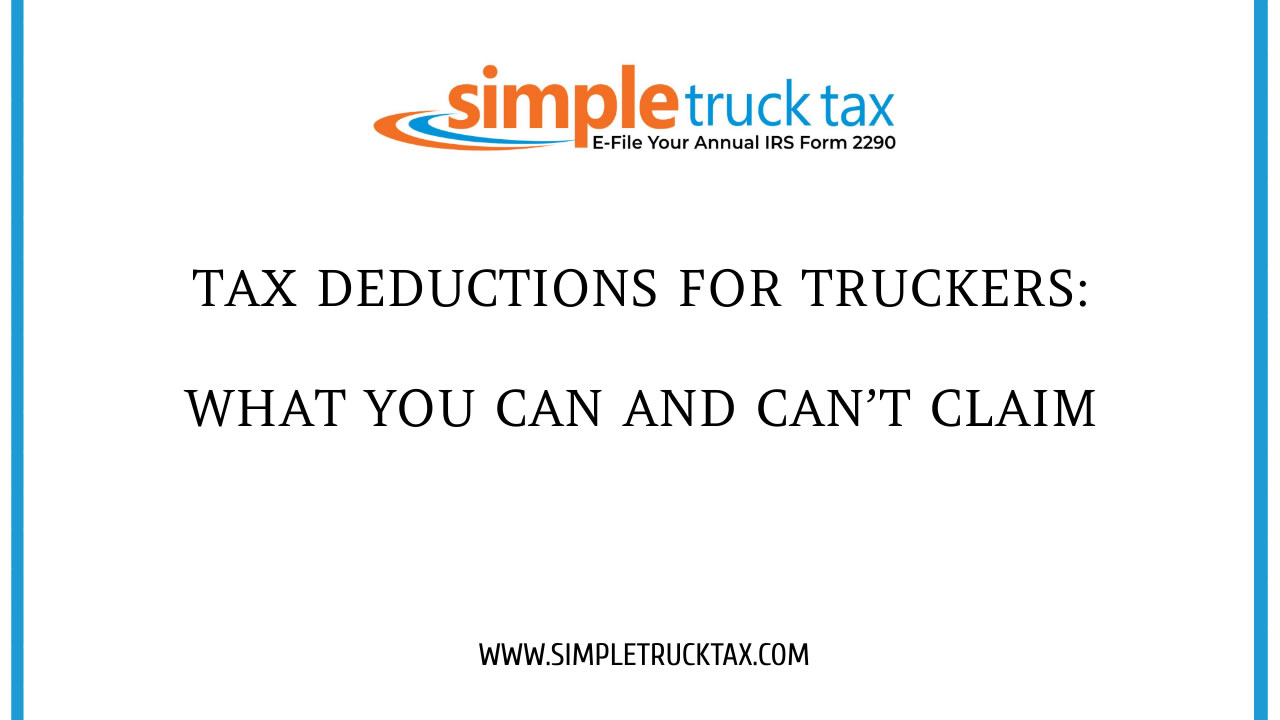
Tax Deductions for Truckers: What You Can and Can’t Claim
As a truck driver, one thing's for sure: the land of taxes is too complex, particularly as far as knowing which expenses one can deduct. As a matter of fact, the IRS offers truckers many kinds of deductions, cutting down their taxable income very significantly. However, knowing what you can and can't claim is very important for maximizing your refund while avoiding potential problems with the tax people. This article will take you through essential truck driver tax deductions as well as tips on how to ensure that you're compliant.
Understanding Business vs. Personal Expenses
Invest in a differentiation between business and personal expenditure before the start of specific business expenses deductions. The IRS views truck driving as being in a business line. Thus, expenses incurred while operating the truck usually qualify for deduction. However, personal items unrelated to the business cannot be claimed.
TIP: Keep complete records of all expenditures and receipts. You may use trucker-specific accounting software or applications that will make this task easier.
Truckers' Tax Deduction
Vehicle Expenses
Actual Costs vs. Standard Mileage Rate
Truckers can take the standard mileage or actual expenses of the vehicles. You can either use the standard mileage rate, in which you multiply the business miles driven by the IRS mileage rate, which changes yearly, or you can actually deduct the expenses: fuel, oil changes, repairs, tires, and depreciation.
Example: If you drove 20,000 miles on business and the standard mileage rate is 65 cents per mile, you may claim up to $13,000. If your actual costs are $15,000, you will be able to deduct this.
Cost of Gas
Fuel is one of the highest overhead expenses that truckers face. You can all your fuel costs related to your business; it could be diesel or gasoline. Be sure to keep receipts and document the purchases. That will show them the claims you made as legitimate and fiscal accountability.
Truck Maintenance and Repairs
Maintenance and repair costs of your vehicle. That will include oil changes, tire rotations, among many other repair costs, whether the time taken to keep your truck in top order.
Insurance
The cost of insurance for your truck will be fully deductible. These costs may include liability insurance, cargo insurance, among other policies necessary for running a business.
Equipment and Supplies
For example, the cost of tools or supplies for your trucking company such as GPS, safety gear, and paper clips qualify as deductions. You can normally expense the cost of a purchase completely in the tax year you incur it while some items have to be depreciated over time.
Meals and Lodging
While on the road, one can spend a lot of money on meals and lodging. Truckers have the opportunity to take a portion of these expenses for themselves. The amount of money that one can use on meals is the standard meal allowance or they have the actual expenses for meals. This goes with the fact that the IRS usually provides a 50% deduction on meals.
For accommodation, when you spend the night while on the road, the hotel nights are 100 percent deductible if you had to stay over, but it has to be solely for business and not a personal vacation.
Tolls and Parking Fees
Fees for tolls and parking while traveling for business are eligible for deductions as well. Truck stop fees and city parking meter payments are among those. Never forget to keep records of payments made on tolls and parking fees while working.
Things You Can't Claim
Not all expenses, though, are eligible for deductions. Here are some specific things you should not claim:
- Travelling Costs : The cost incurred to and from your headquarters cannot be tax-deducted, as these costs are personal.
- Luxury Costs : Any costs of personal luxury items or unnecessary costs that do not belong to your trucking business cannot be claimed. In other words, nonsensical updates for your truck or costly dinners.
Personal Expenses Any cost that you incur during personal travel or entertainment should be left out of your deductions.
Tax Deduction Do's
- Record Everything: Keep an accurate record of all business-related expenses. Use receipts, invoices, and logs to ensure that, at any time of audit, you can be in a position to substantiate your claims.
- Consult with a Tax Expert: Being the trucking industry exposed to multifold tax laws, consultancy from an experienced and well-versed tax professional in the trucking business would not only help to find more and overlooked deductions but also ensure that all tax laws are followed.
- Keep Up-to-date: Tax laws are constantly updating, so being at the forefront of the current IRS guidelines and possible new deductions is what matters most.
Understanding what can and cannot be deducted will help you get the most out of your tax return as a truck driver. The better you know your deductible versus non-deductible expenses, the better prepared you will be to navigate the complexities of taxes that come with this life. As always, consult with a tax professional for the most personalized guidance for your unique situation, ensuring you make the most of deductions and stay compliant with the IRS.
Note: For more information, visit IRS website